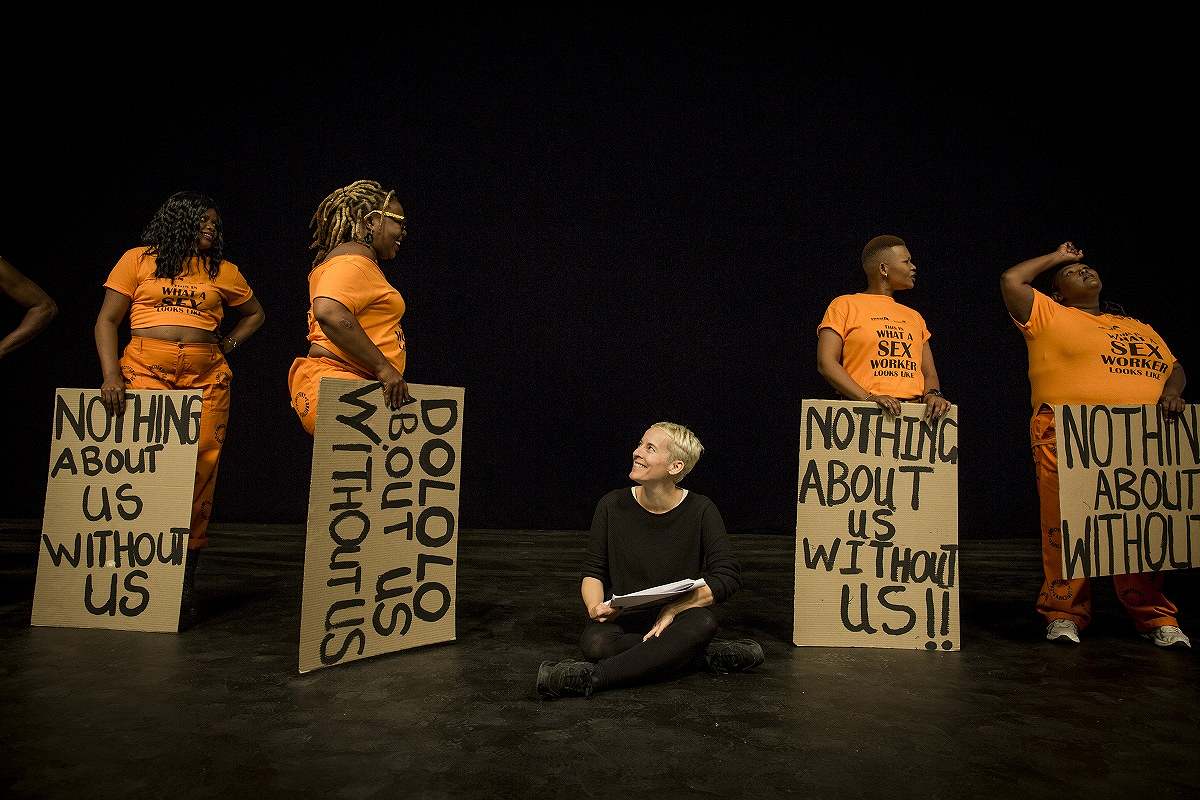
Candice Breitz, a South African Jewish artist who lives in Berlin, on the set of “TLDR” in Cape Town, South Africa, in 2017.
16:43 JST, December 23, 2023
BERLIN – The subject of Candice Breitz’s art installation in Germany’s southwestern state of Saarland was thousands of miles removed from the conflict raging in Gaza: sex workers in South Africa.
And yet her exhibit was one of a slew of cultural events in Germany that have been axed in recent weeks in an effort to steer clear of anything that might be deemed antisemitic.
Under scrutiny is not just the content of the art, but the political positions of its creators.
On Instagram, Breitz, a South African Jewish artist who lives in Berlin, had condemned Hamas and described its Oct. 7 attack as a “horrific loss of innocent lives in Israel,” but she had also strongly criticized the Israeli government for its actions in Gaza – actions she said made Jews around the world less safe.
Unflinching support for Israel and the protection of Jewish life, German politicians regularly stress, are part of modern Germany’s historical responsibility and “Staatsräson” – reason of state. But critics say that official stance is overly restricting the voices of people who don’t hold such black-and-white views on the Israeli-Palestinian conflict, including people from Germany’s ever-evolving immigrant population. Artistic expression has been a particular area of contention.
A DJ wearing a T-shirt with the word “Palestine” in Arabic had his set cut off. A planned photo exhibit in southwestern Germany was canceled as a result of social media posts by its curator, including one describing “genocide” in Gaza. After Russian American journalist Masha Gessen wrote in the New Yoker that Gaza was like a Jewish ghetto under Nazi occupation, a German foundation scaled down the event where they were to receive a prize for political thought. The Frankfurt Book Fair postponed indefinitely its prize ceremony for Palestinian author Adania Shibli.
“Major cultural institutions have silenced themselves in lockstep, canceling productions that deal with the conflict and de-platforming figures who might be critical of Israel’s actions – or who are simply Palestinian themselves,” a group of artists, writers and scholars in Germany wrote in an open letter. “Such voluntary self-censorship has produced a climate of fear, anger, and silence. All this is done under the banner of protecting Jews and supporting the state of Israel.”
Breitz said she learned her exhibition at the Saarland Museum’s Modern Gallery had been canceled when she read about it in the local media. The museum said it did not want to provide a platform to artists who fail to recognize Hamas’s terrorism as “a breach of civilization” – a phrase most commonly used in Germany in reference to the Holocaust.
“What’s happening in the art world through these series of cancellations is almost a purge of anybody who has any kind of empathy for Palestinian civilians,” Breitz said.
“Not standing unilaterally with the state of Israel is triggering for a lot of Germans who still feel that the way to perform their distance from antisemitism is to express unconditional and unquestioning support,” she said.
– – –
The German government’s position
German officials insist that criticism of Israel is allowed in their country, as is support for Palestinian rights. Vice Chancellor Robert Habeck noted in a prominent speech that the German government has called on Israel to protect the civilian population in Gaza, decried the suffering and pushed for the delivery of water, medicine and other supplies. But there is no legitimate justification, he said, for endorsing the destruction of Israel or making Jews fear living freely and safely in Germany.
Germany recorded a 320 percent increase in the number of domestic antisemitic incidents between Oct. 7 and Nov. 9, compared with the same period last year.
Felix Klein, commissioner for Jewish life in Germany and the fight against antisemitism, said increased awareness of actions and statements that might constitute antisemitism was one of the “few positive developments” since the Hamas attack. While even Jewish artists “do get into problems,” he said, “we should not allow antisemitism to be normalized.”
Klein conceded, though, that there is the potential for overreach. “This is a very emotional discussion about where criticism of Israeli policy can be allowed and where does it cross the red line,” he said. “I admit it, sometimes it’s not so easy.”
– – –
The case of the Oyoun cultural center
In Berlin, one of the largest cultural spaces run by people of color had its $1 million a year in state funding withdrawn after holding an event with a left-wing Jewish organization. Louna Sbou, one of the founders of the Oyoun cultural center, said the event with the anti-Zionist group Jewish Voice for a Just Peace in the Middle East was conceptualized as a vigil, in the style of a Jewish shiva, to commemorate victims of both the Hamas killings and the Israeli bombardment of Gaza.
The idea was to come together to mourn, she said. “The conversations were heavy. It felt like a very intense space, but one that was absolutely needed.” The attendees were largely Jewish and German, along with some Palestinians, she said.
But Berlin police were banning pro-Palestinian demonstrations at that point. And the cultural center had been warned in particular about hosting events with the Jewish Voice group, which is part of a movement to boycott Israel that the German parliament classified as antisemitic in 2019.
Sbou said staffers at the cultural center, which describes itself as a “home for queer*feminist, migrant and decolonial perspectives,” found out their funding was in jeopardy when a journalist encouraged her to turn on a live stream of the cultural committee meeting at the Berlin Senate.
Addressing the committee, Joe Chialo, Berlin’s senator for culture, said his department was committed to preventing of all forms of antisemitism. “And when I say against every form, I also mean every hidden form of antisemitism,” he said.
Oyoun, which has an antisemitism ombudsman, has taken legal action against the funding cut.
“I don’t think there’s anything more dangerous for artistic freedom and freedom of speech than if there is a political limitation set on it, like it is here in Germany,” Sbou said.
– – –
A focus on ‘imported’ antisemitism
A 41-year-old German-Palestinian filmmaker, who spoke on the condition of anonymity out of concern that her future work could be jeopardized by speaking openly, said immigrant and minority artists have received disproportionate scrutiny because of a tendency in Germany to see antisemitism as an imported problem.
“That’s a clear racist strategy or tactic to immediately label Arab, Muslim, Palestinian or Syrian refugees as antisemites,” said the filmmaker, who is also an activist with the group Palestine Speaks.
Breitz said her Jewish identity prevented her from being “completely destroyed” by antisemitism allegations, which are more damaging for Palestinians or people with precarious residency status.
The eastern German state of Saxony-Anhalt announced this month that a written commitment to Israel’s right to exist would become a requirement for naturalization. At the national level, Germany’s three governing coalition parties want to stipulate that “antisemitic attitudes or actions” should rule out naturalization, while the largest parliamentary opposition group has called for the effective deportation of non-German nationals convicted of a crime with “antisemitic” motives.
Some critics contend that the furor in the art world does little to protect Jews in Germany or tackle antisemitism among far-right groups. Interior Ministry figures released this year showed that 84 percent of antisemitic crimes were committed by far-right extremists, and polls suggest that right-wing antisemitism is on the rise, condoned by the far-right Alternative for Germany (AfD) party.
“In today’s Germany, a worthy and hard-won commitment to fighting antisemitism has gone off the rails,” historian Jürgen Zimmerer, a German Jew, wrote in a statement of “solidarity” with Breitz. “At the same moment that a far-right party, the AfD, is gathering electoral strength, the fight against antisemitism increasingly targets progressive voices who dissent from dominant German understandings of the political situation in Israel/Palestine. With ever greater frequency, the targets of such attacks are Jewish.”
If the current political climate continues, the filmmaker and Palestine Speaks activist warned, artists and academics may choose to no longer work in Germany because the atmosphere is so “repressive and so controlling.”
“We are now, second-, third- and fourth-generation Palestinians in Berlin and Germany,” she said, pointing to the estimated 20,000 Palestinians in the German capital alone. “And we want to be citizens that can take their place in the public space.”
Top Articles in News Services
-

Survey Shows False Election Info Perceived as True
-

Hong Kong Ex-Publisher Jimmy Lai’s Sentence Raises International Outcry as China Defends It
-

Japan’s Nikkei Stock Average Touches 58,000 as Yen, Jgbs Rally on Election Fallout (UPDATE 1)
-

Japan’s Nikkei Stock Average Falls as US-Iran Tensions Unsettle Investors (UPDATE 1)
-

Trump Names Former Federal Reserve Governor Warsh as the Next Fed Chair, Replacing Powell
JN ACCESS RANKING
-

Producer Behind Pop Group XG Arrested for Cocaine Possession
-

Japan PM Takaichi’s Cabinet Resigns en Masse
-

Man Infected with Measles Reportedly Dined at Restaurant in Tokyo Station
-

Israeli Ambassador to Japan Speaks about Japan’s Role in the Reconstruction of Gaza
-

Videos Plagiarized, Reposted with False Subtitles Claiming ‘Ryukyu Belongs to China’; Anti-China False Information Also Posted in Japan























